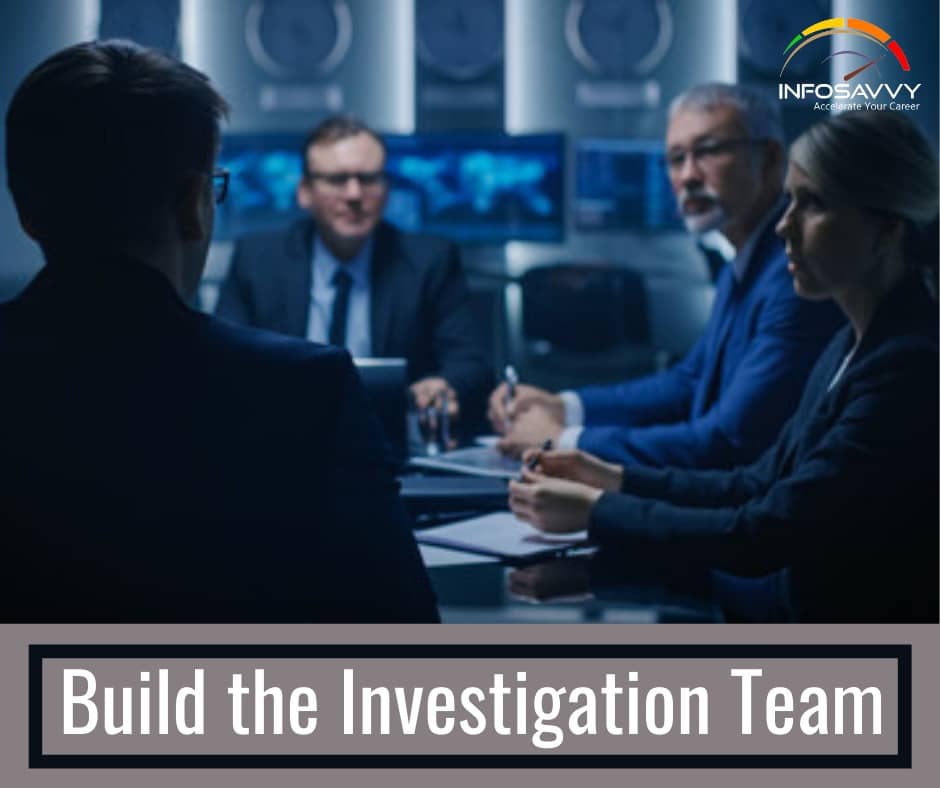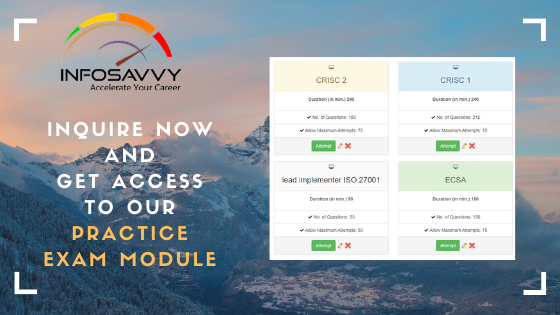To Build the Investigation Team plays a major role in solving a case. The team is responsible for evaluating the crime, evidence, and criminals. Every team member should be assigned a few specific tasks (roles and responsibilities) that let the team analyze the incident easily.
The guidelines for building the investigation team are as follows:
- Determine the person who has to respond to an incident so that a proper internal computer investigation can be performed
- Organize the team members and give responsibility to each member of team
- Appoint a person as a technical lead for the investigation
- The investigation team has to be as small as possible to achieve confidentiality and avoid information leaks
- Provide each team member with the necessary clearance and authorization to complete assigned tasks
- Enlist help from a trusted external investigation team, if required
Computer forensics is the branch of forensic science that deals with criminal offences performed using technical devices such as computer or any digital media devices. The evidence for such cases is present on digital storage media such as CDs/OVDs, Blu-ray discs, USBs, mobile phones, BlackBerrys, iPods, etc.
Related Product : Computer Hacking Forensic Investigator
To find the appropriate evidence on these digital devices, the following people may be involved:
- Attorney: Helps in giving legal advice about how to carry out the investigation, and the legal issues involved in the forensics investigation process.
- Photographer: Photographs the crime scene and the evidence gathered. He or she should have an authentic certification. This person is responsible for shooting all the evidence found at the crime scene, which records the key evidence in the forensics process.
- Incident Responder: Responsible for the measures taken when an incident occurs. The incident responder is responsible for securing the incident area and collecting the evidence that is present at the crime scene. He or she should disconnect the system from other systems to stop the spread of an incident from one system to another.
- Decision Maker: The person responsible for authorization of a policy or procedure during the investigative process. Based on the incident type, makes a decision about the policies and procedures necessary to handle the incident.
- Incident Analyzer: Analyzes the incidents based on their occurrence. He or she examines the incident with regard to its type, how it affects the systems, different threats and vulnerabilities associated with it, etc.
- Evidence Examiner Investigator: Examines the evidence acquired and sorts the useful evidence. Examines and sorts the evidence according to its relevancy to the case. Maintains an evidence hierarchy with the most important evidence given a high priority and the evidence with less importance has a lower priority.
- Evidence Documenter: Documents all the evidence and the phases present in the investigation process. The evidence documenter gathers information from all the people involved in the forensics process and documents it in an orderly fashion, from incident occurrence to the end of the investigation. The documents should contain complete information about the forensics process.
- Evidence Manager: Manages the evidence. The evidence manager has all the information about the evidence, for example, evidence name, evidence type, time, source of evidence, etc. He or she manages and maintains a record of the evidence such that it is admissible in the court of law.
- Expert Witness: Offers a formal opinion as a testimony in a court of law. Expert witnesses help to authenticate the facts and witnesses during any complex case. Expert witnesses also assist in cross-examining witnesses and evidence, as various factors may influence a normal witness.
join from best cyber security institute CHFI v9 it covers detailed methodological approach to computer forensic and evidence analysis.
Forensics Practitioner Certification and Licensing
In the field of computer forensics, digital evidence plays a vital role in tracking the perpetrator. Evidence tampered in any way from start to end of the forensic investigation process is not admissible in a court of law. The overall success of a computer forensic laboratory mainly relies on experience gathering, knowledge sharing, ongoing education, and investment in human resources development.
To conduct computer forensic investigations that are legally sound, it is necessary to employ skillful, experienced, licensed, and certified investigators. The experience and skills will help the investigator to solve the case easily, accurately, and in lesser time.
Also Read : Forensics Software
To perform the investigation in a forensically sound manner, forensic practitioners must go through:
Certification:
Most of the computer forensic laboratories expect job candidates possessing a higher degree and a certification in the field of forensic science and crime scene investigations, as these will make the investigation trustworthy and accurate. Having a certificate in the field of forensic investigation validates both the extent of knowledge and the hands-on proficiency of an individual. The investigators have to annually improve their skills and undergo training to be up-to-date with the new technologies in the field of forensic science and routine retesting.
Licensing:
Many states and local law enforcement require forensic practitioners or computer forensics investigators to have licenses in accordance with the state’s licensing standards. To obtain a license, the forensic practitioner must abide by the state’s licensing board regulations and pass the regulatory examination or tests. Hiring a licensed investigator will increase the reputation and trustworthiness of a company as well as improve the firm’s reliability to provide testimony in court.
Some states do not have specific licensing regulations, but have a set of legal code of ethics as criteria for forensic investigation. In this case, forensic practitioners must know what code of ethics the states follow where they practice or testify.
Questions related to this topic
- What is a computer forensics investigation plan?
- How is digital evidence analyzed?
- What are the steps involved in forensic analysis?
- How can email be investigated and used as evidence?
This Blog Article is posted by
Infosavvy, 2nd Floor, Sai Niketan, Chandavalkar Road Opp. Gora Gandhi Hotel, Above Jumbo King, beside Speakwell Institute, Borivali West, Mumbai, Maharashtra 400092
Contact us – www.info-savvy.com



